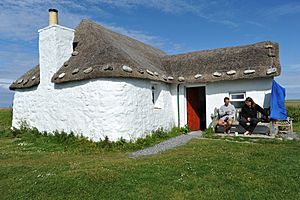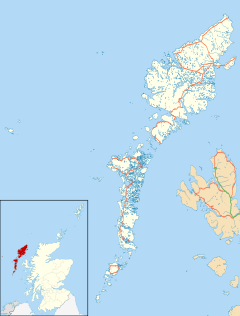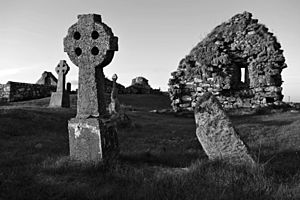Howmore facts for kids
Quick facts for kids Howmore
|
|
|---|---|
 Howmore youth hostel |
|
| Language | Scottish Gaelic English |
| OS grid reference | NF765362 |
| Civil parish | |
| Council area | |
| Lieutenancy area | |
| Country | Scotland |
| Sovereign state | United Kingdom |
| Post town | ISLE OF SOUTH UIST |
| Postcode district | HS8 |
| Dialling code | 01878 |
| Police | Northern |
| Fire | Highlands and Islands |
| Ambulance | Scottish |
| EU Parliament | Scotland |
| UK Parliament |
|
| Scottish Parliament |
|
Howmore (which is Togh Mòr or Tobha Mor in Scottish Gaelic) is a small place on the island of South Uist. This island is part of Scotland. Howmore is located southwest of a lake called Loch Druidibeg. To the east, you can see the mountain Haarsal, which is 139 metres (456 feet) tall. Just south of Howmore is a smaller village called Howbeg. Howmore is also part of the larger area known as the parish of South Uist.
Contents
Exploring Howmore's Landscape
The area around Howmore is mostly flat. However, it is dominated by a large mountain called Beinn Mhòr. You can have a great day hiking on Beinn Mhòr and Hecla. Hecla is 606 metres (1,988 feet) high and is one of South Uist's tallest hills.
About 3 kilometres (2 miles) north of Howmore is the Loch Druidibeg Nature Reserve. This special place is very important for greylag geese that come here to have their babies. It is also a safe home for the corncrake, a bird that is now very rare in Britain. Most corncrakes in Britain live only in the Western Isles, where Howmore is located. The main road, the A865, runs right next to Howmore.
Near a place called Milton, about 11 kilometres (7 miles) south of Howmore, you can find the ruins of the birthplace of Flora MacDonald. She was a famous Scottish woman from history. A stone monument, called a cairn, marks the spot.
On the southern side of Beinn Mhòr, there is a wooded area called Allt Volagir. This is one of the few natural woodlands left in the Hebrides islands.
Howmore's Past: A Look at History
Howmore is well-known for its amazing collection of old, ruined churches and chapels. The most impressive remains are from the Teampull Mor, which means "Large Church" or St Mary's. Only a part of its eastern wall is still standing. This church was likely built around the 13th century and was used as the main church for the area.
Long ago, these islands were covered in trees. People often say that the Vikings cut down all the trees when they arrived. However, some historians disagree with this idea.
Life in the Howmore Community
The Local Church
During a time in history called the Scottish Reformation, Howmore became a Protestant area. However, most people (about 95%) on South Uist remained Roman Catholic. The Howmore Church, built in 1858, is quite special because of this. It is also one of the few churches in Scotland that has its Communion table in the middle. The church is painted white and is used as a landmark by fishermen out at sea.
Fun and Leisure
Howmore is also home to some of Scotland's best examples of buildings with thatched roofs. The youth hostel in Howmore is run by the Gatliff Hebridean Hostels Trust. It is a charming white-painted building with a thatched roof. From the hostel, you can see amazing views to the east, looking over the ruined churches towards the peak of Hecla mountain.
Images for kids






